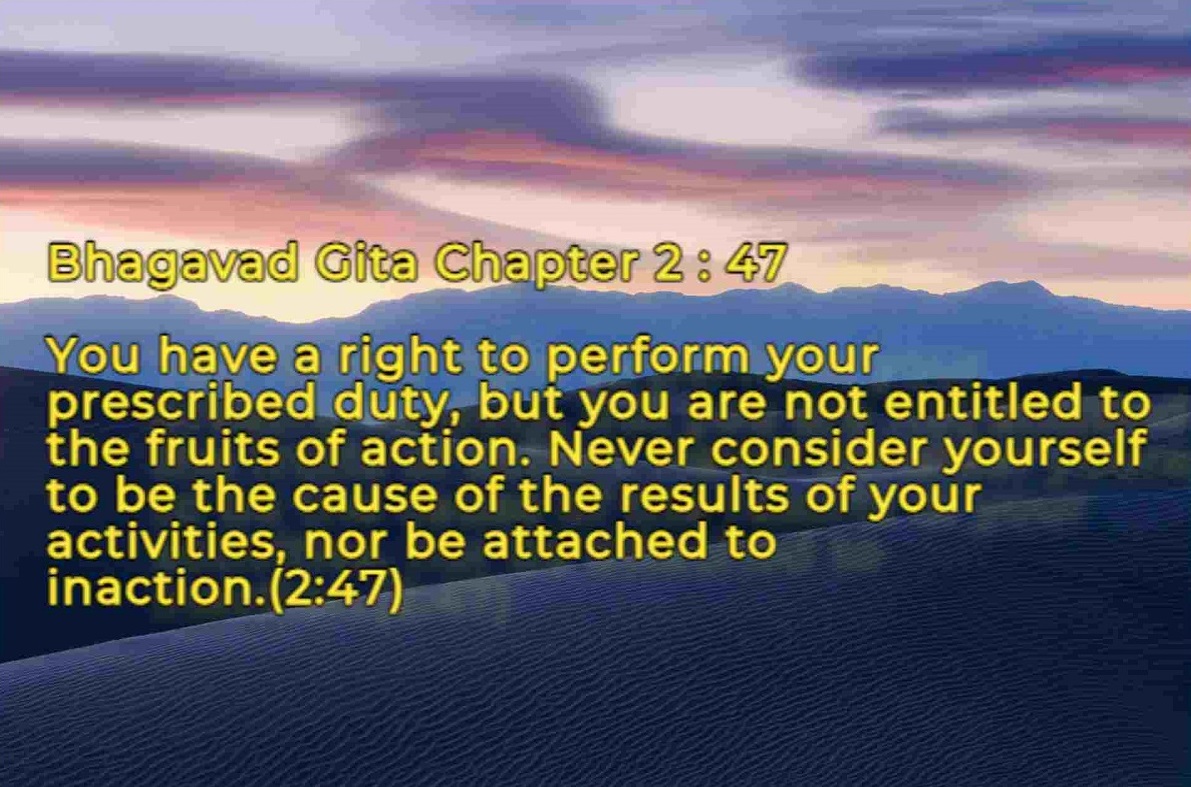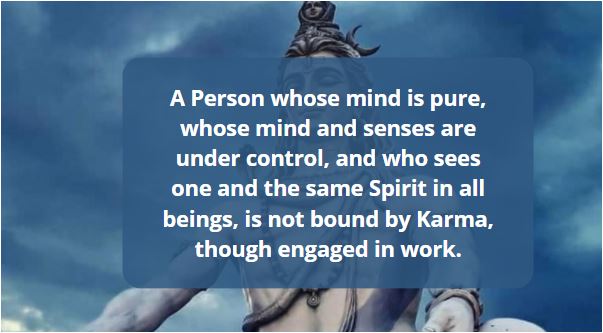Karma quotes from Bhagavad Gita keeps everyone inspired while performing our day to day activities. Lord Krishna say's in Bhagavad Gita, Karma yoga is the spiritual practice of "selfless action performed for the benefit of others".
Bhagavad Gita Quotes on Karma :
You have the right to work only but never to its fruits.
1. Material – You profit at others’ expense.
2. Physical – You grab another’s loaf of bread.
3. Emotional – You sacrifice your child’s well being to satisfy your ego!
4. Intellect – You impose your ideas on others.
5. Spiritual – You convert others to your faith.
Now lets look at the Karma quotes from Gita in more detail.
The Article is divided into two parts
2.Karma Bhagavad Gita Quotes Chapter wise
What is Karma Yoga
The word “karma” means “action.” The result of our actions is referred to as karma-phalam in Sanskrit, or the fruit of one’s actions. ”Phalam” means fruit.
Karma states that your work is your responsibility, not its result. Bhagavad Gita says ,never let the fruits of your actions be your motive. Nor give in to inaction. Set firmly in yourself, do your work, not attached to anything. Remain even minded in success, and in failure. Even mindedness is true yoga.
Karma yoga is a path to reach moksha (spiritual liberation) through work. It is rightful action without being attached to fruits or being manipulated by what the results might be, a dedication to one's duty, and trying one's best while being neutral to rewards or outcomes such as success or failure.
The tendency for a human being to seek the fruits of action is normal, but an exclusive attachment to fruits and positive immediate consequences can compromise dharma.
Now,Lets's see the list of Slokas about karma from Bhagavad Gita.
Karma Bhagavad Gita Quotes Chapter wise
Bhagavad Gita Chapter 2 Verse 39
O Arjuna.,Wisdom was said about knowledge-yoga (Sankhya-yoga) for you and Now listen to the science of God-dedicated, selfless action (Karma Yoga), so that if you do deeds with this wisdom, then you will be able to free yourself from the bondage of deeds. (2:39)
Bhagavad Gita Chapter 2 Verse 40 (Bhagavad Gita Karma Quotes)
In this way, there is no harm, and no resultant defect while performing karma, but even a little progress of this selfless action protects us from the great fear of birth and death. (2:40)
Karma Bhagavad Gita Quotes from Bhagavad Gita Chapter 2 Verse 41
Bhagavad Gita Chapter 2 Verse 47 -Karma Gita Quotes
You have the right to do karma, there is no right in the fruits of it, so you neither consider yourself to be the reason for the fruits of your actions and neither should you have any attachment to not doing karma. (2:47)
You have a right to perform your prescribed duty, but you are not entitled to the fruits of action. Never consider yourself to be the cause of the results of your activities, nor be attached to inaction.(2:47)
Karma Quotes from Bhagavad Gita Chapter 2 Verse 48
Do your duty to the best of your ability, O Arjuna, with your mind attached to the Lord, abandoning attachment to the results, and remaining calm in both success and failure. Equanimity of mind is called Karma Yoga (because equanimity leads to union with God.(2.48)
Bhagavad Gita Chapter 2 Verse 50 -Gita Karma Quotes
A Karma Yogi or the selfless person becomes free from both vice and virtue in this life itself. Therefore, strive for selfless service. Working to the best of one’s abilities without becoming attached to the fruits of work is called Karma Yoga or Seva. (2.50)
Bhagavad Gita Chapter 2 Verse 51
Karma Yogis are freed from the bondage of rebirth due to renouncing (attachment to) the fruits of all work, and they attain a blissful divine state of salvation or Nirvana. (2.51)
Bhagavad Gita Chapter 3 Verse 03
Lord Krishna said: In this world I have stated a twofold path of spiritual discipline in past---the path of Self-knowledge (for the contemplative ones) and the path of unselfish work (Seva, Karma Yoga) for all others. (3.03)
Bhagavad Gita Chapter 3 Verse 04-05 -Karma Bhagavad Gita
One does not attain freedom from the bondage of Karma by merely abstaining from work. No one attains perfection by merely giving up work because no one can remain action less even for a moment. Everything in the universe is driven to action---helplessly indeed---by the forces of Nature. (3.04-05)
Inspiring Karma Bhagavad Gita Quotes Continues..
Bhagavad Gita Chapter 3 Verse 07
One who restrains the senses by (a trained and purified) mind and intellect and engages the organs of action to Karma Yoga or selfless service without attachment, is considered superior. (3.07)
Bhagavad Gita Chapter 3 Verse 09
Human beings in this world are bound by work that is not performed as a selfless service . Therefore, becoming free from attachment to the fruits of work, do your duty to the best of your abilities as a service to Me (for the good of humanity). (3.09)
Bhagavad Gita Chapter 3 Verse 17
On The Other Hand, If a Sincere Person Tries To Control The Active Senses By The Mind And Practice Karma-Yoga Without Attachment, He Is By Far Superior. (3:17)
Bhagavad Gita Chapter 3 Verse 18
King Janaka and many others attained perfection of Self-realization by selfless service alone. You also should perform your duty with a view to guide people and for the welfare of society. (3.20)
Karma Quotes Bhagavad Gita Chapter 3 Verse 31-32
Those who always practice this teaching of Mine with faith and free from criticism become free from the bondage of Karma. But those who find fault with this teaching and do not practice it, should be considered ignorant, senseless, and confused. (3.31-32)
Karma Bhagavad Gita Quotes
Bhagavad Gita Chapter 4 Verse 01
Lord Krishna said: I taught this Karma Yoga, the eternal science of right action, to King Vivasvan. Vivasvan taught it to Manu; Manu taught it to Ikshvaku.(4.01)
Bhagavad Gita Chapter 4 Verse 02
Thus, the saintly Kings knew this science of proper action handed down in succession. After a long time, this science was lost from this earth.(4.02)
Bhagavad Gita Chapter 4 Verse 04
Karma does not bind me because I have no desire for the fruits of work. One who fully knows me and practices this truth, is also not bound by Karma. (4.14)
Bhagavad Gita Chapter 4 Verse 17
The enlightened Karma yogi on the other hand knows what is action in inaction and inaction in action (4.17).
Bhagavad Gita Quotes from Gita Chapter 4 Verse 22
A Karm yogi who is satisfied with the gain comes naturally by his will, who is free from all conflicts and does not envy anyone, who remains stable in success and failure, is not bound by Karma.(4.22)
Bhagavad Gita Chapter 4 Verse 23
All Karmic bonds of a Karma Yogi---who is free from attachment, whose mind is fixed in Self-knowledge, and who does work as a service to the Lord, merges completely in the knowledge form as Brahman(4.23)
Bhagavad Gita Chapter 4 Verse 37
The fire of Self-knowledge reduces all bonds of Karma to ashes, O Arjuna, like the blazing fire reduces wood to ashes. (4.37)
Bhagavad Gita Chapter 4 Verse 41
Work does not bind a Self-conscious person who has renounced work---by renouncing the fruits of work---through Karma Yoga and whose confusion (with regard to body and Spirit) is completely destroyed by Self-knowledge, O Arjuna. (4.41)
Therefore, cut the ignorance-born confusion (with regard to body and Spirit) by the sword of Self-knowledge, resort to Karma Yoga, and get up for the war, O Arjuna. (4.42) Inspiring Karma Quotes Bhagavad Gita
Bhagavad Gita Chapter 5 Verse 01
Arjuna asked: O Krishna, You praise the path of transcendental knowledge, and also the path of selfless service (Karma Yoga). Tell me, definitely, which one is the better of the two paths? (5.01)
Bhagavad Gita Chapter 5 Verse 04
The ignorant-not the wise consider the path of Self-knowledge and the path of selfless service (Karma Yoga) as different from each other. The person who has truly mastered one, gets the benefits of both. (5.04)
Bhagavad Gita Chapter 5 Verse 05(Karma quotes on Gita)
The supreme state that is attained by means of karm sanyās is also attained by working in devotion. Hence, those who see karm sanyās and karm yog to be identical, truly see things as they are.(5.05)
Bhagavad Gita Chapter 5 Verse 06
But true renunciation (the renunciation of doership and ownership), O Arjuna, is difficult to attain without Karma Yoga. A sage equipped with Karma Yoga quickly attains Nirvana. (5.06)
Perfect renunciation (karm sanyās) is difficult to attain without performing work in devotion (karm yog), O mighty-armed Arjun, but the sage who is adept in karm yog quickly attains the Supreme.(5.06)
Bhagavad Gita Chapter 5 Verse 07
A Karma Yogi, whose mind is pure, whose mind and senses are under control, and who sees one and the same Spirit in all beings, is not bound by Karma, though engaged in work. (5.07)
Bhagavad Gita Chapter 5 Verse 10
One Who Performs His Duty Without Attachment, Surrendering The Results Unto The Supreme Lord, Is Unaffected By Sinful Action, As A Lotus Leaf Is Untouched By Water.( 5.10)
Bhagavad Gita Chapter 5 Verse 11
The Karma Yogis perform action-without attachment with their body, mind, intellect, and senses only for the purification of their mind and intellect. (5.11)
Bhagavad Gita Chapter 5 Verse 12
A Karma Yogi attains Supreme peace by abandoning attachment to the fruits of work, while others who are attached to the fruits of work become bound by work with a personal motive. (5.12)
Bhagavad Gita Chapter 6 Verse 01
Lord Krishna said: One who does not perform the prescribed duty just to enjoy its fruit is both a renunciant and a Karma Yogi. One does not become a renunciant, merely by not lighting the fire, and one does not become a yogi merely by performing no duty.(6.01)
Bhagavad Gita Chapter 6 Verse 02
O Arjuna, renunciation (Samnyasa) is the same as Karma Yoga because, one does not become a Karma Yogi because no human being can attain yoga (divine) without sacrificing the desire for sense-pleasure (pleasure of the body). (6.02)
Bhagavad Gita Chapter 6 Verse 03
For the wise, who seek to attain yoga of meditation or the equanimity of mind, Karma Yoga is said to be the means. For one who has attained yoga, equanimity becomes the means of Self-realization.(6.03)
Bhagavad Gita Chapter 7 Verse 28
But the persons purified by unselfish deeds, whose Karma has come to an end, become free from the delusion of pairs of opposites and worship Me with firm resolve. (7.28)
Bhagavad Gita Chapter 8 Verse 03
Lord Krishna said:The indestructible, transcendental living entity is called Brahman, and his eternal nature is called adhyatma, the self. Action pertaining to the development of the material bodies of the living entities is called karma, or fruitive activities. (8.03)
Bhagavad Gita Chapter 9 Verse 28
You shall become free from the bondage, both good and bad, of Karma and come to Me by the yoga of renunciation. (9.28)
Bhagavad Gita Chapter 9 Verse 21
They again return to the mortal world---after enjoying the wide world of heavenly pleasures---upon exhaustion of the fruits of their good Karma. Thus, following the injunctions of the Vedas, persons working for the fruit of their actions take repeated births and deaths.(9.21)
Bhagavad Gita Chapter 10 Verse 03
One who knows Me as the unborn, the beginning less, and the Supreme Lord of the universe, is considered wise among mortals and becomes liberated from the bondage of Karma. (10.03)
Bhagavad Gita Chapter 13 Verse 31
Because of being beginning less and undetectable by the three modes of material Nature, the eternal Supersoul---even though dwelling in the body as a living entity---neither does anything nor becomes tainted by Karma, O Arjuna. (13.31)
Bhagavad Gita Chapter 16 Verse 19
I direct these haters, these cruel, sinful, and mean people, into the cycles of death and birth in the womb of demons (or degraded parents) again and again, according to their Karma. (16.19)
Bhagavad Gita Chapter 18 Verse 13-14
Learn from Me, O Arjuna, the five causes, as described in the Samkhya doctrine, for the accomplishment of all actions. They are: the physical body (the seat of Karma), the modes of material Nature (Gunas, the doer), the eleven organs of perception and action (the instruments), various life forces (Prana), and the fifth is the Karmic impressions (or Samskaras, fate). (18.13-14)
Bhagavad Gita Chapter 18 Verse 61
The Supreme Lord is situated in everyone’s heart, O Arjuna, and is directing the wanderings of all living entities, who are seated as on a machine, made of the material energy.(18.61)
Bhagavad Gita Chapter 18 Verse 66
Setting aside all Dharmas, just surrender to My Will. I shall liberate you from all sins or bonds of Karma. Do not grieve.(18.66)
These were the accumulation of Karma yoga quotes from Bhagavad Gita chapter wise.
Hope you all will have good times after going through it.
Stay blessed and keep on sharing also let me know if I miss any verse from any of the chapters.
Related Articles:
| Types of food Bhagavad Gita | Bhagavad Gita About Anger |
| Rules To Read Bhagavad Gita | Teachings of Gita With Sloka |























2 Comments
Radhe krishna
ReplyDeleteKarma Bhagavad Gita Quotes | Every Karma quotes from Gita
thanks for shared.
keep it up....
Bhagavad Gita quotes in hindi
Very Nice word. Jai Sri Krishna
Delete